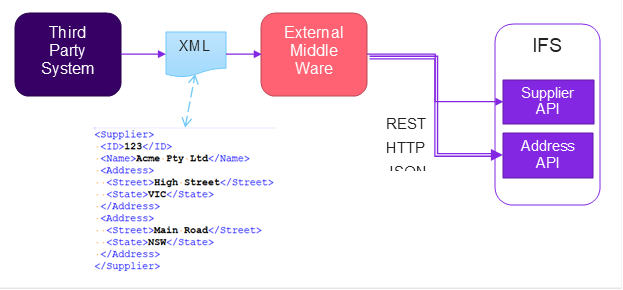Inbound Integrations to IFS Using RESTful APIs¶
In IFS Cloud, the so-called Projections used by IFS Aurena can also be reused for integration purposes. These are easy to use REST APIs following the Open Data Protocol (OData) standard and standard HTTP methods (GET, POST, PUT, PATCH, DELETE) are used to call the APIs.
In IFS Cloud there are also a number of “Premium” REST APIs recommended for integration. Premium API will be having comprehensive documentation on the appropriate usage of the API and the changes to the API will be done whilst maintaining compatibility.
The REST APIs are the preferred integration method, because of the ease of use, and they work well in cloud hosted environments, since the endpoints and protocol (https) is the same as for IFS Aurena. No special configuration of firewalls or file storage etc. is required.
Relevant APIs can easily be found by navigating to the target pages in IFS Aurena, enabling the Debug Console, which will show page info including Projection names. The use the API Explorer in IFS Aurena to look up further details about the APIs, including OpenAPI v2, OpenAPI v3, Odata specifications and IFS REST API documentation.
The Projections use OAuth authentication. In IFS Cloud the authentication mechanism is independent from the main/int endpoints ('Compatibility mode' that was available in Apps 10 is no longer available). In other words, basic authentication is available in both end points but only for ease of upgrade. That means basic authentication is not for the consumption of integrations.
Custom Fields are also accessible through the Aurena APIs. Do however note that the Aurena APIs of the “Standard” class are “atomic”. If a downstream system wants to send a structured message to IFS, it needs to be broken up into several calls using a service bus or middleware such as Dell Boomi. In the below example, a middleware is splitting an XML containing supplier and address information into several calls.

Note that in IFS Cloud, Process Enrichment BPAs can be used to populate additional data, for instance populate the ‘Purchase’ tab when a new supplier is created (which using Custom Event Actions on IFS Applications 10 may cause “mutating tables” and require work-arounds if LUs reference each other).